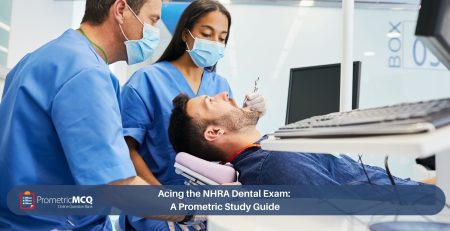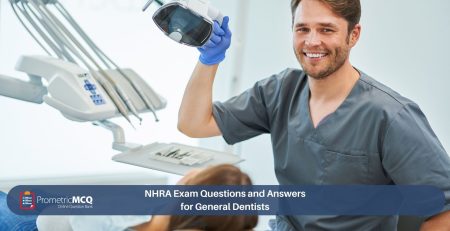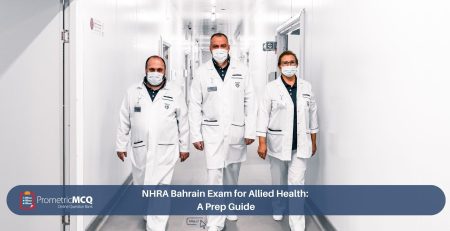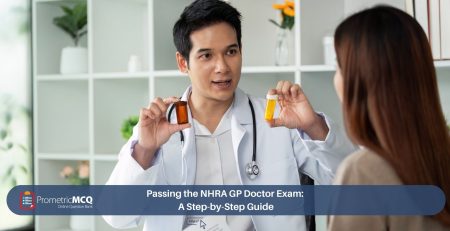
NHRA Exam for Doctors: High-Yield MCQs and Key Topics
fatima@prometricmcq.com2025-09-19T01:29:47+00:00Table of Contents
ToggleNHRA Exam for Doctors: High-Yield MCQs and Key Topics (2025)
For physicians aspiring to practice in the Kingdom of Bahrain, the National Health Regulatory Authority (NHRA) exam stands as a critical and decisive milestone. This licensure examination is the cornerstone of a rigorous process designed to ensure that every doctor practicing in Bahrain meets the highest international standards of medical competence. To succeed, one must move beyond rote memorization and embrace a deeper level of clinical reasoning. The most effective way to achieve this is by focusing on high-yield topics and mastering the art of the Multiple-Choice Question (MCQ).
The NHRA exam is a test of application, not just knowledge. It is built around clinical vignettes that mirror the challenges of daily medical practice, demanding sharp diagnostic skills, sound management plans, and an unwavering commitment to patient safety. The key to unlocking a passing score lies in a targeted preparation strategy—one that deconstructs the exam’s focus areas and uses high-quality MCQs to build the mental framework needed for success.
This ultimate 2025 guide has been crafted to be your definitive resource for this challenge. We will provide an in-depth analysis of the most frequently tested, high-yield topics across the medical spectrum. More importantly, we will present you with realistic, case-based sample MCQs, complete with exhaustive rationales that illuminate the clinical thinking behind each answer. Complemented by a detailed 10-point FAQ, this guide will equip you with the strategy, knowledge, and confidence to ace your NHRA medical exam.
Key Takeaways for NHRA Medical Exam Success
- Focus on High-Yield Systems: Internal Medicine, particularly Cardiology, Endocrinology, and Pulmonology, forms the largest part of the exam.
- Master the “Next Best Step”: Many questions will present a clinical scenario and ask for the single most appropriate next step in diagnosis or management.
- Clinical Vignettes are Everything: Practice dissecting long-stem questions to quickly identify key patient data, chief complaints, and critical lab values.
- Guidelines are Gospel: Your answers should be based on the latest international, evidence-based guidelines (e.g., ACC/AHA for cardiology, GINA for asthma).
- MCQ Practice is Active Learning: The most efficient study method is to solve thousands of high-quality MCQs and, crucially, to read every rationale to understand why options are right or wrong.
Core Philosophy of the NHRA Exam: A Test of Clinical Competence
Before diving into topics, it’s vital to understand the exam’s philosophy. It is designed to answer one fundamental question: “Is this physician safe and competent to manage patients independently at the level of a General Practitioner?” This philosophy dictates the entire exam structure and is a core component of any effective Bahrain NHRA exam preparation strategy.
Every MCQ is a miniature clinical encounter. Your task is to play the role of the attending physician: gather the data, form a differential, and make a decisive, evidence-based choice.
High-Yield Topics & Sample MCQs by Medical Specialty
Let’s break down the most critical topics and illustrate them with exam-style MCQs. The goal is not just to test your knowledge but to train your clinical reasoning.
1. Internal Medicine: The Heart of the Exam
This domain is the undisputed heavyweight of the NHRA exam. You must have a robust and current knowledge of common internal medicine conditions.
High-Yield Topics:
- Cardiology: Management of Hypertension (JNC8/ACC-AHA guidelines), Acute Coronary Syndrome (distinguishing STEMI vs. NSTEMI, initial management with MONA-B), Heart Failure (systolic vs. diastolic, cornerstone medications), and Atrial Fibrillation (rate vs. rhythm control, CHADS2-VASC score for anticoagulation).
- Endocrinology: Diabetes Mellitus (diagnostic criteria, HbA1c targets, mechanism of action of oral hypoglycemics and insulins), DKA and HHS (distinguishing features, management principles), and Thyroid Disorders (hyperthyroidism vs. hypothyroidism, interpreting TFTs).
- Pulmonology: Asthma (step-up therapy based on GINA guidelines), COPD (GOLD stages, management of acute exacerbations), and Community-Acquired Pneumonia (CURB-65 score, common pathogens, and antibiotic choices).
- Gastroenterology: GERD, Peptic Ulcer Disease (H. pylori treatment), and Viral Hepatitis (interpreting serology).
Sample MCQ 1: Cardiology
A 62-year-old male with a history of hypertension and type 2 diabetes presents to the emergency department with a 2-hour history of severe, crushing substernal chest pain radiating to his left arm. His ECG shows 3mm ST-segment elevation in leads II, III, and aVF. His blood pressure is 90/60 mmHg and his lungs are clear on auscultation. What is the most appropriate next step in management?
- Administer sublingual nitroglycerin
- Administer intravenous morphine
- Administer intravenous beta-blockers
- Arrange for urgent percutaneous coronary intervention (PCI)
Correct Answer: D
Rationale: This patient is having an acute ST-elevation myocardial infarction (STEMI), specifically an inferior wall MI as indicated by ST elevation in leads II, III, and aVF. The definitive treatment for STEMI is rapid reperfusion to restore blood flow to the occluded coronary artery. Percutaneous coronary intervention (PCI) is the gold standard for reperfusion if it can be performed in a timely manner (ideally within 90 minutes of first medical contact). All other actions are secondary to this critical, time-sensitive intervention.
Why other options are incorrect:
A: Nitroglycerin is used for anginal pain but is relatively contraindicated in an inferior wall MI. These MIs can involve the right ventricle, making the patient highly sensitive to preload reduction, which can cause profound hypotension. Given his borderline blood pressure of 90/60, nitrates should be avoided.
B: Morphine is appropriate for pain relief in STEMI, but it is not the most critical or definitive treatment. Reperfusion is the priority.
C: Beta-blockers are part of STEMI management but should be used with caution in patients with hypotension or signs of heart failure. They are not the immediate priority compared to reperfusion.
2. Pediatrics
Pediatric questions focus on recognizing common illnesses, understanding vaccination schedules, and identifying red flags for serious conditions.
High-Yield Topics:
- Infectious Diseases: Differentiating viral vs. bacterial pharyngitis, management of acute otitis media, bronchiolitis (RSV), and croup.
- Growth and Development: Knowing key developmental milestones for age (e.g., sitting, walking, first words).
- Vaccinations: Familiarity with the routine pediatric immunization schedule.
- Emergencies: Recognizing and managing dehydration, febrile seizures, and respiratory distress.
Sample MCQ 2: Pediatrics
A 2-year-old boy is brought to the clinic with a 3-day history of a barking cough, low-grade fever, and noisy breathing that is worse at night. On examination, you hear inspiratory stridor. The child is not cyanotic and his oxygen saturation is 97% on room air. What is the most appropriate initial treatment?
- Inhaled albuterol
- Intravenous ceftriaxone
- A single dose of oral dexamethasone
- Chest physiotherapy
Correct Answer: C
Rationale: The clinical presentation of a barking cough and inspiratory stridor is classic for laryngotracheobronchitis, or croup. Croup is a viral infection (most commonly parainfluenza virus) that causes inflammation in the subglottic airway. The cornerstone of management for all severities of croup is a single dose of a corticosteroid, such as dexamethasone. Steroids reduce airway inflammation and edema, resolving the symptoms. This patient has mild-to-moderate croup and will benefit significantly from this treatment.
Why other options are incorrect:
A: Albuterol is a bronchodilator used for bronchospasm in conditions like asthma or bronchiolitis. It has no role in treating the upper airway inflammation of croup.
B: Ceftriaxone is an antibiotic. Since croup is viral, antibiotics are not indicated unless a bacterial superinfection is suspected, which is rare.
D: Chest physiotherapy is used for clearing lower airway secretions and is not helpful for the upper airway obstruction seen in croup.
3. Obstetrics & Gynecology (OB/GYN)
For the GP exam, OB/GYN questions focus on routine antenatal care and the diagnosis of common gynecological problems.
High-Yield Topics:
- Antenatal Care: Screening tests in pregnancy (e.g., for gestational diabetes, group B strep), and management of pre-eclampsia.
- Gynecology: Diagnosis and management of Polycystic Ovary Syndrome (PCOS), abnormal uterine bleeding, and common sexually transmitted infections.
- Contraception: Counseling on different methods of contraception.
Sample MCQ 3: OB/GYN
A 28-year-old woman presents with a 6-month history of irregular menstrual cycles, hirsutism, and acne. Her BMI is 32 kg/m². What is the most likely diagnosis?
- Premature ovarian failure
- Hypothyroidism
- Polycystic Ovary Syndrome (PCOS)
- Cushing’s syndrome
Correct Answer: C
Rationale: The patient’s presentation fits the classic triad for Polycystic Ovary Syndrome (PCOS) according to the Rotterdam criteria. These criteria require two out of three of the following: 1) oligo- or anovulation (presenting as irregular cycles), 2) clinical or biochemical signs of hyperandrogenism (hirsutism, acne), and 3) polycystic ovaries on ultrasound. This patient meets the first two clinical criteria, making PCOS the most likely diagnosis, especially in the context of obesity.
Why other options are incorrect:
A: Premature ovarian failure would present with amenorrhea and symptoms of estrogen deficiency (like hot flashes), not signs of androgen excess.
B: Hypothyroidism can cause irregular menses but is not typically associated with hirsutism or acne.
D: Cushing’s syndrome can cause irregular menses and hirsutism, but it is much rarer and usually presents with other specific signs like central obesity, purple striae, and a “moon face.” PCOS is far more common.
Frequently Asked Questions (FAQs) for the NHRA Medical Exam
Internal Medicine is by far the most dominant section. Within that, Cardiology and Endocrinology (especially hypertension, ischemic heart disease, and diabetes) are the highest-yield topics. A strong foundation in these areas is essential for passing the exam.
Exam fees are subject to change. You should always check the official NHRA and Prometric websites for the most current fee structure. The cost typically involves an application fee to the NHRA and a separate exam fee paid to Prometric when you schedule your test date.
Yes. The NHRA exam is administered by Prometric, which has a vast network of test centers in major cities all over the world. You can schedule and take the exam in your home country before you even begin the visa process for Bahrain.
There is no single “official” book. The exam is based on international standards of care. Most successful candidates use a combination of resources, including review books for international exams (like USMLE Step 2 CK or PLAB), subscription to an evidence-based clinical resource like BMJ Best Practice or UpToDate, and, most importantly, a high-quality MCQ bank like the one offered at PrometricMCQ.
The GP exam tests the breadth of medical knowledge required for primary care. A specialty exam (e.g., for a cardiologist) tests the depth of knowledge in that specific field. It assumes you already have the GP-level knowledge and will ask more advanced questions about complex cases, recent clinical trials, and sub-specialty topics.
The Primary Source Verification (PSV) report from the DataFlow Group is a mandatory credentialing document. It verifies the authenticity of your qualifications. You must have a positive PSV report before the NHRA will issue your license, even after you pass the exam. It is advisable to start this process in parallel with your exam preparation.
First, analyze your performance. Try to recall the topics where you felt weakest. The most common reason for failure is insufficient practice with case-based MCQs. The best strategy for a retake is to shift your focus from passive reading to active learning by solving as many high-quality practice questions as possible and thoroughly studying the rationales.
No, the clinical content is purely based on international medical standards. You will not be asked about the structure of the Bahraini healthcare system, local epidemiology, or administrative policies. The focus is entirely on your competence as a physician.
Aim to complete the first 50 questions in the first hour. This puts you on a good pace. Use the “flag” feature for any question that takes you more than 90 seconds. Answer it with your best guess, flag it, and move on. You can return to all flagged questions at the end if you have time. This prevents you from losing easy marks by running out of time.
After you pass the exam, the NHRA issues an eligibility letter, which is typically valid for one year. You must find employment and have your employer activate your license within this one-year window.
Conclusion: Strategic Preparation is the Key to Success
The NHRA Medical Licensing Exam is a formidable challenge, but it is a predictable one. It consistently tests a core set of high-yield clinical topics through the medium of the case-based MCQ. By focusing your energy on these key areas, adopting an active, question-based study method, and honing your clinical reasoning skills, you can master the content and the format of the exam. Success is not about knowing everything; it’s about deeply understanding the things that matter most. With the right strategy, you can confidently pass this exam and begin a rewarding medical career in the Kingdom of Bahrain.
Ready to Master the High-Yield Topics?
Our premium question bank for the NHRA General Practitioner exam is filled with hundreds of high-yield cases, detailed explanations, and simulated tests designed to mirror the real exam and ensure you pass on your first attempt.










